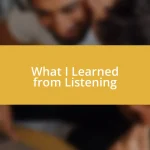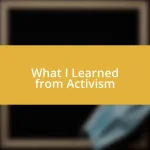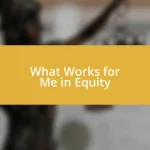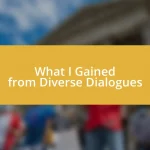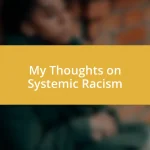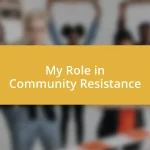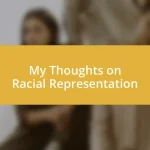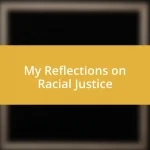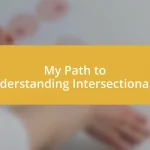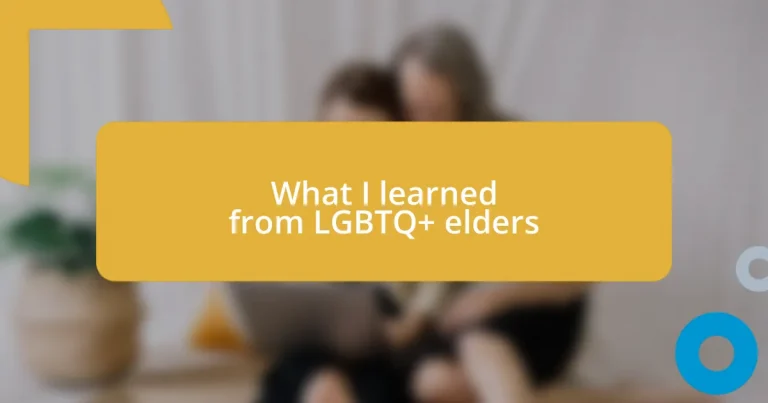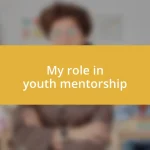Key takeaways:
- LGBTQ+ elder wisdom emphasizes the importance of resilience, community support, and embracing one’s identity despite societal challenges.
- Storytelling is a vital tool for bridging generational gaps and fostering empathy, enabling younger generations to learn from the struggles and victories of elders.
- Building support networks and advocacy rooted in shared experiences can empower individuals and strengthen community ties.
- Modern activism should incorporate the values of solidarity and inclusivity learned from elders to create safe spaces for dialogue and growth.
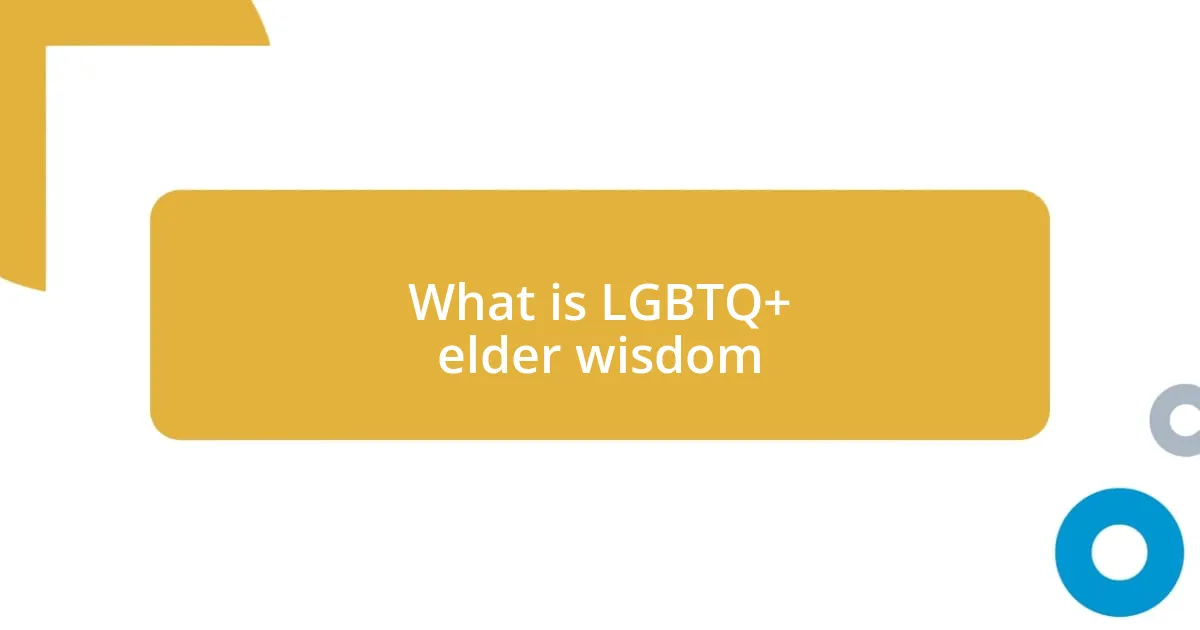
What is LGBTQ+ elder wisdom
LGBTQ+ elder wisdom is a tapestry woven from years of resilience, love, and unapologetic authenticity. These elders have often navigated a world rife with discrimination and misunderstanding, and their experiences offer profound lessons on strength and identity. Can you imagine living through times when simply being yourself was considered revolutionary? Their stories are a testament to the power of endurance and self-acceptance.
I remember a conversation with an older gay man who shared how he found solace in community during a time of struggle. He spoke of the chosen families that formed in LGBTQ+ spaces when traditional families often turned away. This sense of belonging instilled in him a combativeness against adversity—what a powerful lesson in creating support networks for ourselves! We all can learn from this—the importance of forging connections that uplift and validate our identities.
Elder wisdom also reflects on the importance of history, not just as a backdrop but as a guide for future generations. LGBTQ+ elders often remind us of the battles fought and the progress made, urging younger folks to advocacy and activism. Have you ever felt overwhelmed by the world? It’s through their narratives that we recognize the relevance of fighting for equality and understanding; their insights provide a grounding perspective in the ever-evolving landscape of LGBTQ+ rights.
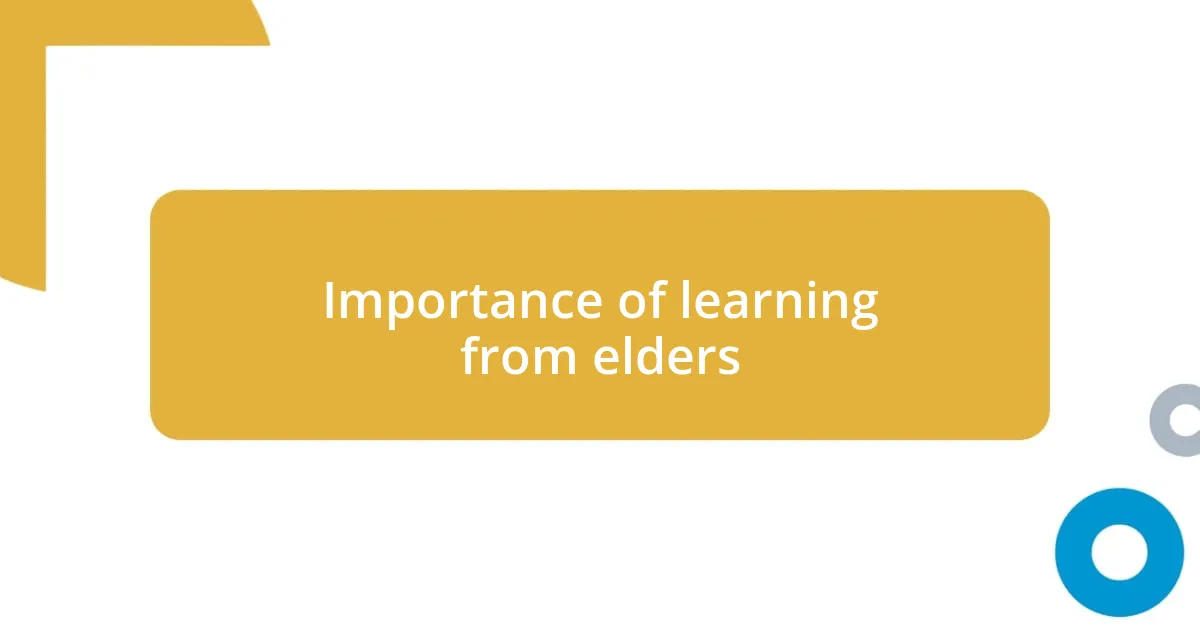
Importance of learning from elders
Learning from elders offers a treasure trove of insights that can shape our understanding of identity and community. One critical lesson I’ve gathered is the essence of resilience. An elder once shared how they faced isolation during a time of societal rejection, yet they emerged stronger. This profound perseverance creates a roadmap for us, illustrating that adversity can lead to personal growth and a deeper sense of belonging.
Additionally, the wisdom of LGBTQ+ elders highlights the importance of storytelling. I recall a poignant moment when an elder recounted their first Pride march, filled with hope and fear. The energy in their voice mirrored the excitement of being seen and heard for the first time. Sharing these stories bridges gaps between generations, enabling us to learn about our struggles and victories in a relatable way, fostering empathy along the way.
Understanding the historical context of our community is also invaluable. An elder’s narrative about past struggles often reminds me to appreciate the rights I enjoy today. Their experiences serve as a reminder that each step forward on the LGBTQ+ journey has been paved by those who came before us. It encourages reflection and gratitude, reminding us of our responsibility to uphold the legacy of resilience and activism.
| Lessons Learned | Personal Insights |
|---|---|
| Resilience in Adversity | Stories of strength empower us to overcome challenges. |
| Importance of Storytelling | Sharing experiences fosters empathy and connection. |
| Historical Context | Understanding past struggles guides us in advocating for our future. |
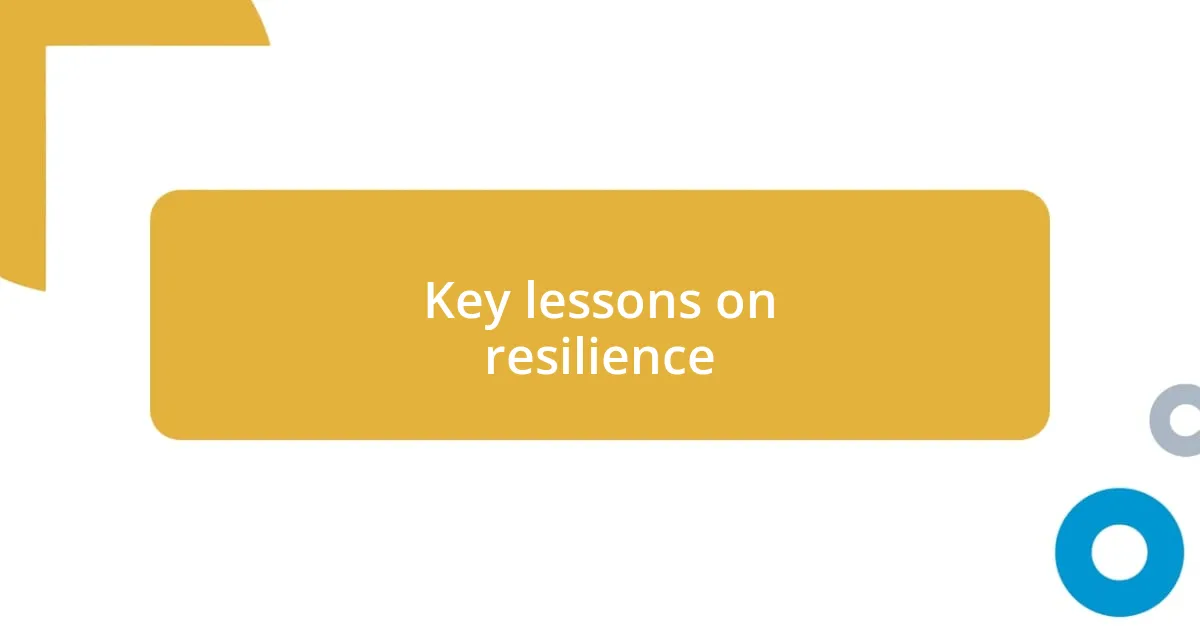
Key lessons on resilience
Resilience is often born out of necessity, and LGBTQ+ elders exemplify this principle beautifully. One elder I spoke with recounted facing constant turmoil during the AIDS crisis, a time saturated with loss and uncertainty. Yet, amid the heartbreak, they found the strength to create support networks that helped others navigate their grief. This resilience is powerful; it’s a reminder that, even when faced with unimaginable challenges, we can emerge not just intact but ready to lift others up.
In thinking about the key lessons on resilience, a few essential takeaways stand out:
- Connection is Vital: Building supportive networks can help us weather emotional storms.
- Adaptability Matters: Flexibility in the face of change allows us to find new paths when old ones are blocked.
- Courage is Contagious: When we witness others overcoming hardship, it inspires us to confront our own struggles with bravery.
- Hope is a Choice: Maintaining a sense of optimism, even in dark times, enables us to envision a better future.
- Sharing Your Story: Narrating our experiences fosters not only personal healing but also a community grounded in shared understanding.
These nuggets of wisdom resonate deeply with me, reminding us all that resilience isn’t just about survival—it’s about thriving and helping others do the same.
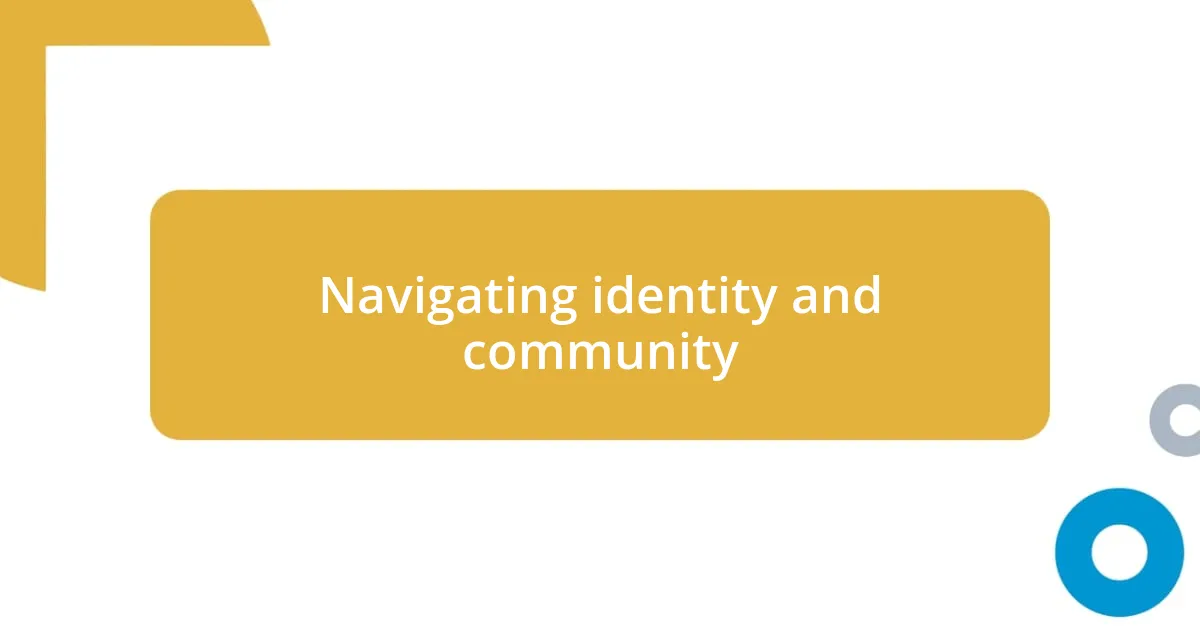
Navigating identity and community
Navigating identity and community can be a labyrinthine experience, especially when you come from a marginalized background. I remember a gathering where an elder vividly described their first encounter with a chosen family—a group that accepted them wholeheartedly. Hearing how this support shaped their sense of self made me reflect on the importance of cultivating our own communities. It begs the question: how do we create spaces where everyone feels valued and authentic?
Community isn’t always about surface-level connections; it often involves vulnerability. I’ve learned from elders that sharing our innermost identities can be both daunting and liberating. In one enlightening conversation, an elder spoke about the relief they felt after finally embracing their full identity and how that change drew others to them. This resonates with me; being open and honest invites others to do the same. Can you recall a moment when vulnerability brought you closer to someone?
Moreover, the elder’s stories illuminate the fluidity of identity itself. As they shared how their understanding of themselves evolved over decades, it struck me how vital acceptance—both of ourselves and others—truly is. One elder reflected on the shifts in their identity, emphasizing that finding comfort in our ever-changing selves cultivates deeper connections within the community. After all, isn’t it empowering to acknowledge that identity is not static but a personal journey?
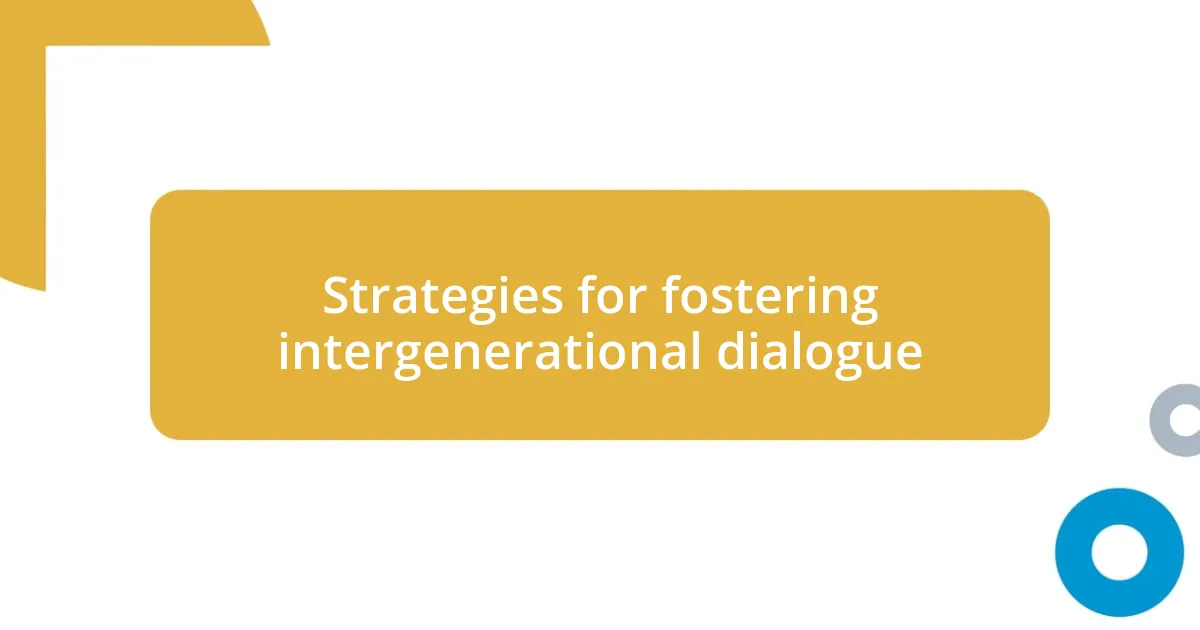
Strategies for fostering intergenerational dialogue
Fostering intergenerational dialogue is deeply fulfilling but requires intentional effort. One effective strategy I’ve found is organizing storytelling sessions where younger and older members of the community can share their experiences. I remember sitting in a circle, listening as an elder recounted their first pride march. That vivid recounting not only honored their journey but also inspired the younger attendees to reflect on their own activism and struggles. It made me wonder: how might our histories overlap in surprising ways?
Another powerful method is to create collaborative projects that allow participants to work together towards common goals. For instance, I participated in a community garden initiative that brought together various generations. As we dug in the soil, we shared laughter, tips on gardening, and even life lessons rooted in our different experiences. This hands-on approach fosters connection; after all, what better way to cultivate growth than by literally planting seeds together? Have you ever noticed how shared tasks can bridge gaps between different age groups?
Lastly, embracing digital platforms can also enhance intergenerational connections. I’ve seen elders engage with technology to share their stories online, which opens up avenues for dialogue with younger folks who are savvy with social media. One elder I know launched a weekly podcast featuring interviews with youth, sharing their valuable life lessons while also inviting fresh perspectives. It’s exciting to contemplate how technology can cultivate these discussions: what stories could we unearth if we all contributed?
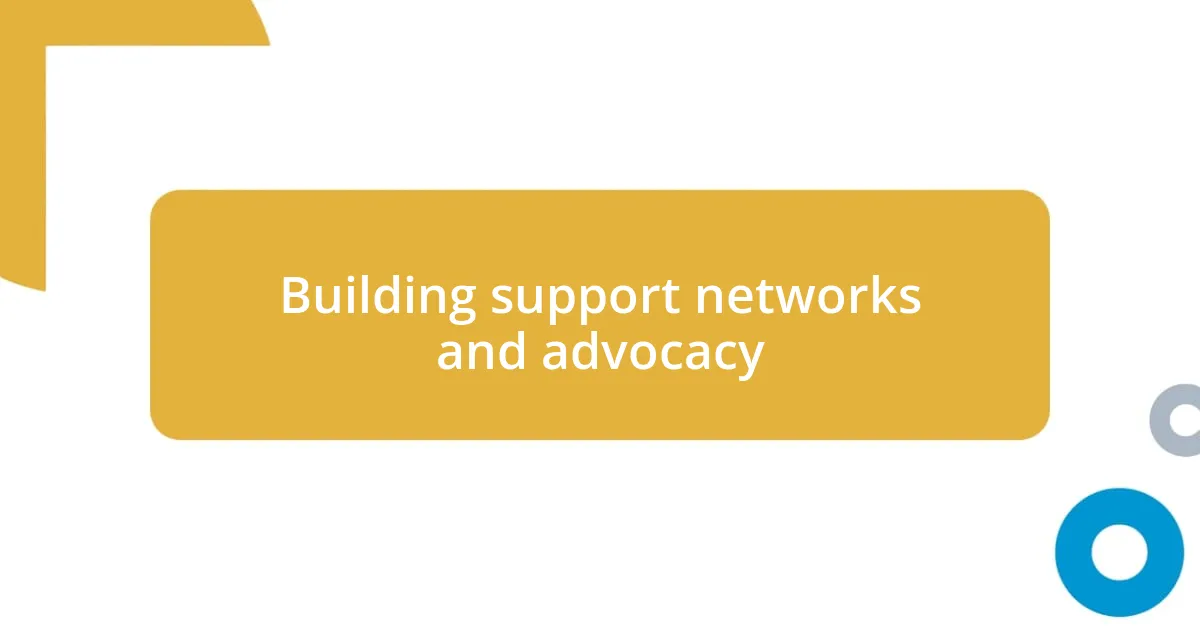
Building support networks and advocacy
Building support networks and advocacy often requires a strong foundation of participation and collaboration. I recall attending a community forum where an elder spoke passionately about how local activism provided a lifeline during tough times. They emphasized, “When we unite, we transform our struggles into collective power.” It made me reflect—how often do we recognize the strength in our unity?
Creating support networks is not just about offering help; it’s also about mentoring. One time, I had the chance to be paired with an elder for a mentorship program. They shared their own experiences advocating for LGBTQ rights back in the day, instilling in me a sense of responsibility to carry that torch forward. Seeing their passion opened my eyes to the impact one individual can have when they stand up for their community. I often ponder: how might we inspire the next generation to continue this vital work?
Advocacy also thrives on shared stories of resilience. At a pride event, I listened as community members recounted their journeys—each narrative shrouded in challenges yet bursting with hope. One elder’s story about mobilizing support during a crisis sparked a dialogue. It was a poignant reminder that our voices are powerful, and when we share them, we build a network that can withstand adversity. What if we all took the time to share our unique journeys? Wouldn’t that create a tapestry of support that wraps around us all?
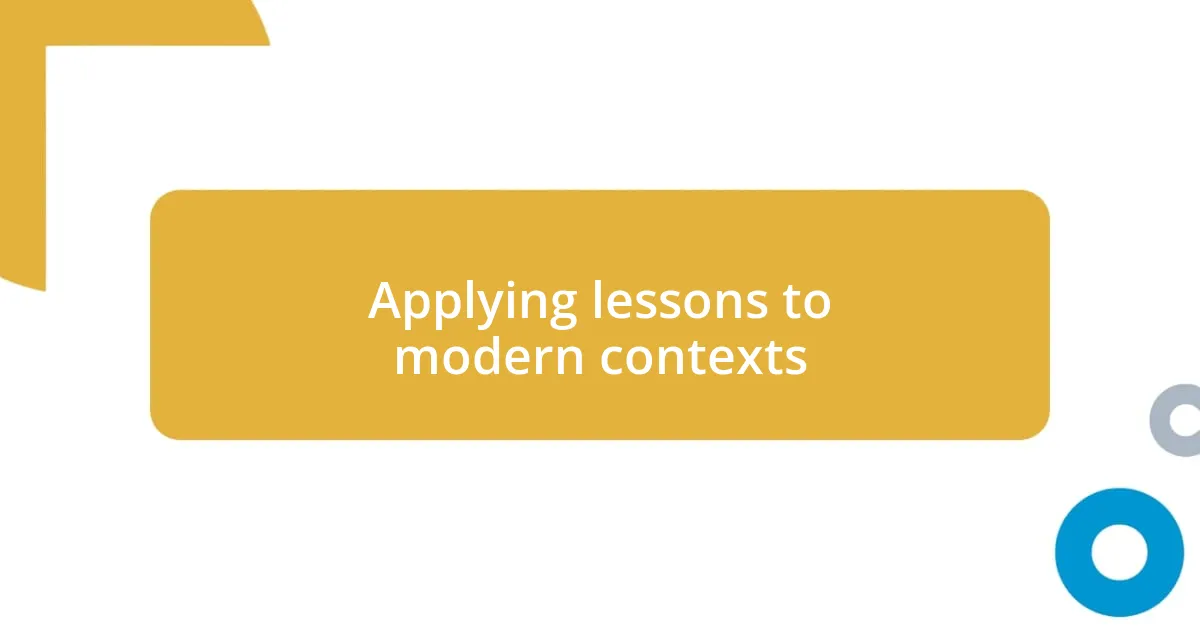
Applying lessons to modern contexts
Applying the lessons learned from LGBTQ elders to modern contexts involves recognizing the evolving nature of activism and community. For example, I often think about how the elders I’ve encountered have navigated their identities in spaces that were not always accepting. One elder, with a soft yet firm voice, shared how they would dress boldly despite societal ridicule in the 70s. Today, I see how their courage fuels my own expression and reminds me to push boundaries in a world that is still figuring itself out. Isn’t it incredible how their past defiance continues to resonate today?
In contemporary settings, it’s essential to integrate the values of solidarity and inclusivity that these narratives encapsulate. I remember forming a group with my friends to advocate for LGBTQ rights on campus, inspired by elder activists’ stories of standing together against injustice. We organized events that honored their struggles and worked to educate our peers about the importance of support. This collective effort made the weight of our voices feel more potent; after all, we carry the legacy of those who came before us. Have you ever felt the power of unity when standing alongside others who share your cause?
Moreover, the wisdom of LGBTQ elders shines in how we approach dialogue today. I recently discovered an online forum where elders and youth engaged in rich discussions about identity and acceptance—an idea sparked by a story about an elder’s struggle for recognition back in the day. It made me realize that creating safe spaces for these conversations is crucial. We can learn from their experiences while simultaneously shaping our perspectives. How can we ensure that these dialogues continue to bridge generational gaps in understanding and compassion?

